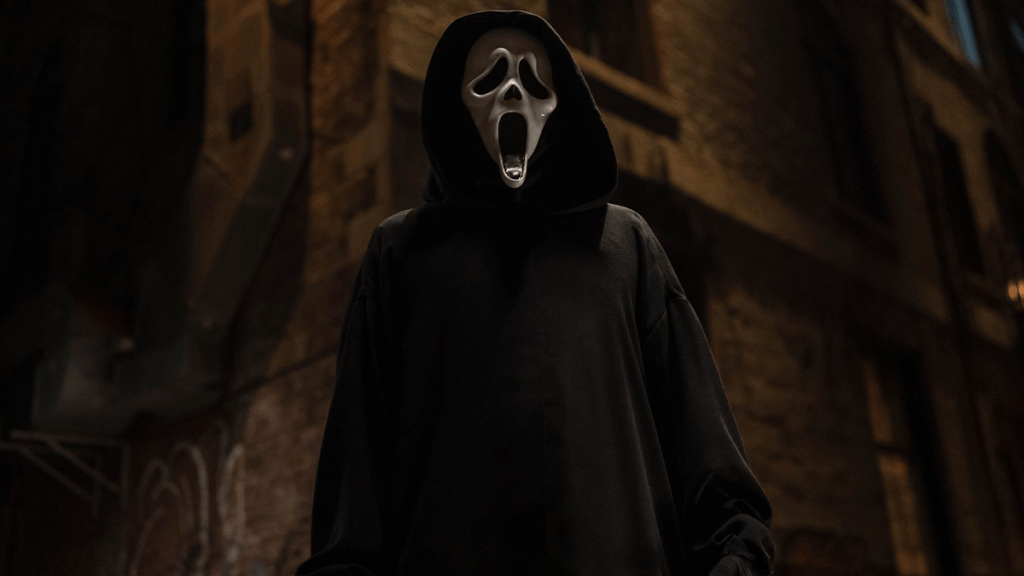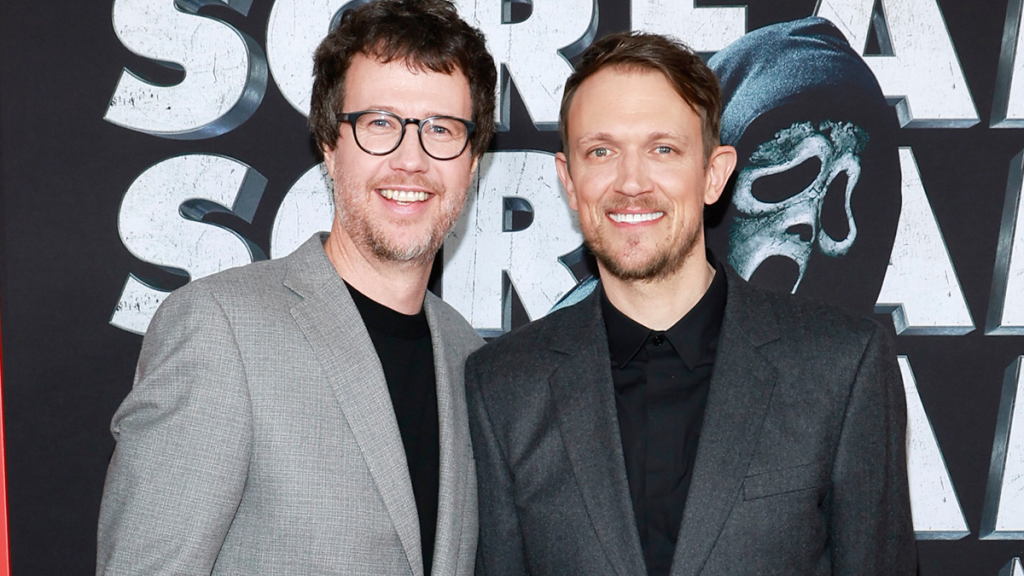ComingSoon Editor-in-Chief Tyler Treese spoke with Scream VI directors Tyler Gillett and Matt Bettinelli-Olpin about the meta-horror sequel (watch and read more interviews). Scream VI is out on digital now and now streaming on Paramount+. It will be available on 4K and Blu-ray on July 11.
“Following the latest Ghostface killings, the four survivors leave Woodsboro behind and start a fresh chapter. Just as they begin to feel a sense of normalcy, they receive that infamous call. Ghostface is more brutal and relentless than ever and will stop at nothing to hunt them down,” reads the movie’s official synopsis.
Tyler Treese: Tyler, I love the start to Scream VI. You get that brutal kill sequence and we see Ghostface unmask. How was it, following the formula of these starts but also setting new ground and trying something different with this opening?
Tyler Gillett: That’s sort of the fun and the goal of the opening, right? I feel like the expectation is so high with what the opening of a Scream movie should be and has to achieve. Obviously, just starting from literally the first movie … which to us, I think, is one of the most perfect sequences ever filmed — the opening of the original Scream. So I think the goal first and foremost is to be scary. I think the other thing — and look, Guy [Busick] and Jamie [Vanderbilt], the writers, they just have a real understanding … a deep, deep understanding and love of the franchise.
But I think they, as fans and then as writers, also have a real clear sense of what the audience is expecting. So they are always just playing all of those different notes and pulling all of those different levers. And for us, look, reading [Scream] V and reading VI, I think it’s that moment and then the reveal that we’re kind of most excited about. And the opening of this is one of the greatest, most finely-tuned bits of scriptwriting we’ve ever read. It’s such a cool sequence.
Yeah, it turned out great. Matt, can you talk about the attitude of you two going into this after the success of 2022’s Scream? Seeing how well that was received by the audience, I’m sure that gave you a lot of confidence going into VI.
Matt Bettinelli-Olpin: I don’t know if it gave us a lot of confidence. I don’t think we … I don’t think we have the ability to feel that. [Laugh].
Tyler Gillett: True story!
Matt Bettinelli-Olpin: You know what I mean?
Tyler Gillett: What is that? What is that confidence thing that you speak of?
Matt Bettinelli-Olpin: But … joking aside, I think that the kind of family that we built making Scream V … from Guy and Jamie, the writers, to the cast and the producers, it’s like everybody involved … it was just such a wonderful experience. And I think, going into Scream VI, we kind of all felt that, “Let’s go do this again and let’s not try to repeat what we did before, but let’s have the confidence to go do our version of another one that goes the exact opposite direction.”
And I think there was a real leap of faith amongst everybody involved creatively. Whereas Scream V was very much about the previous four movies and how our movie was going to be tied to those, Scream VI, I think on every level, felt like “Well, let’s go do one that’s just kind of like a little batshit and a little out there and gonzo.” And that was kind of our M.O. going into it. We talked to a lot of the cast about those ideas and hopefully that’s what comes through, is that it feels a little bit grimy, a little bit left of center.
Tyler, building off what Matt said, one thing that’s been remarkable about the Scream franchise is there’s this in-universe reverence for the events of the first movie. We’re still filling the aftereffects of that initial murder spree. Do you feel like the franchise can go outside that lens, or would that be missing the point because everything just goes back to that route?
Tyler Gillett: That’s a good question. I mean, I think part of it is … it’s hard to tell a Scream story without being reverent of that movie and of the events of that movie. I think. Look, I think part of that — I don’t know if you’d call it a hang-up necessarily — but it was such an effective movie and and meant so much to all of us, you know? When we first saw it, I think it was influential in ways that are too deep and nuanced and numerous to really begin to list. And so I think that it is “in” us, that movie. It is so much a part of the DNA of what we love about being storytellers and what we love about watching movies.
I think that the original Scream flexed a muscle for us as audiences that we hadn’t really had flexed in that way before. I think it’s hard to not draft off of it, in some way, but I think that it’s one of the fun challenges of making a Scream movie and now having done two is how do you play in that sandbox in a really original way? And I think because the movies are so self-referential, I’m not sure you’d be able to tell a story without at least attempting a nod at what has has come before. It feels like it would be oddly maybe out-of-step with the franchise. But who knows? We’ve taken some crazy risks that we didn’t think would work and somehow have landed. So maybe anything’s possible! [Laugh].
Matt, Hayden Panettiere returning as Kirby was so exciting in this movie. Could you speak to your use of legacy characters? What’s impressed me is that you actually bring these characters back. They have arcs, they have development, and they’re not just there for the marketing purpose. They’re also blending in and building that next generation of the great cast you guys have assembled for V and VI. Can you speak to using those returning characters effectively?
Matt Bettinelli-Olpin: Yeah, we treat all characters like they’re characters — it’s just part of the way we approach every movie we do. They’re like real, full people, you know? It’s not just the cameo thing. So much of Scream — kind of to your previous question — is about legacy and is about how the past affects the present and so on. So there’s this, again, meta thing. In the last movie, it was with like Neve [Campbell] and Courteney [Cox] and David [Arquette] and then now bringing Hayden in, it just feels like it ties it together, in a way, that makes — hopefully — these two movies that we’ve made and the original four that Wes made feel like a piece of a whole. Which, to us, is one of the things that I think, as fans, we love.
Then you can go watch them in any order and go like, “Oh, these aren’t just standalones and they don’t discount things that happened.” It’s all a story about people who are affected by a single event that happened 25-26 years ago. To Hayden specifically, we had wanted to bring her back in Scream V because ourselves, like much of the online Scream fandom — are big Kirby fans, but we felt like in the version that would’ve happened in Scream V, it would’ve been too much of a cameo — kind of what you’re talking about. Us and producers and Jamie and Guy agreed that if we’re gonna bring Hayden back, because we talked to her during Scream V, that we have to do Kirby justice. So we all kind of agreed with Hayden, “Let’s just put a pin in this, and if we’re lucky enough to make a Scream VI, we’ll actually have Kirby be a character.”
When we got lucky enough to be able to do Scream VI, Guy and Jamie wrote this great script where she was an FBI agent and it instantly clicked. I don’t think any of us, I know at least for Tyler and me and Chad [Villella] who couldn’t join us … we did not expect her to be an FBI agent, which is why we loved it, because it made sense. You just went, “Oh right. She was that rebellious kid and now she’s an authority, but I understand why that happened.” It makes it such an interesting arc for her off-screen story that we didn’t get to see and then starting this movie to see where she goes.

Tyler, this movie’s wild. There are multiple Ghostfaces. How was choreographing the fight scenes? Were they tied to whoever was under the mask at that point?
Tyler Gillett: No, we actually talk a lot about how when you put on the mask, you actually become Ghostface. That Ghostface is this other kind of character … that there’s this power, there’s this sensibility, there’s this psychotic energy that you imbue when you put the mask on. So it’s really about a character becoming Ghostface instead of a character putting on a Ghostface mask. So I think what that does — and it’s one of the reasons why I think Ghostface has become such an iconic slasher and can stand shoulder-to-shoulder with Freddy and Jason and Leatherface — [is] he’s just this imposing thing that feels otherworldly at times and kind of superhuman in his power, but at the end of the day, is very human when that mask comes off.
I think that that allows us to really bend the rules a little bit, right? And have some fun with how big and crazy and gonzo that set pieces can be. At the end of the day for us, it’s about creating an experience that is always really thrilling and really fun. For as much as you have to set, set up a series of rules and create some guardrails for yourself so that the movie makes sense and so you’re not just defying wild logic at all times, but that you’re not creating such a strict sense of rule that you’re not able to really go crazy and have fun and really dial it up, sometimes to an absurd level. For us … if we’re being honest, that’s the stuff that we love to watch.
So having the resources and the story and the cast — and certainly Max [Laferriere] who was the stunt performer that was in the Ghostface costume the majority of the shoot — just being able to cut that performer loose to do go full force all the time was really, really fun. Not having to pay too much mind and too much attention to, “Well this is actually this person under the mask so they’d fight differently.” It’s Ghostface. When you’re on the run from Ghostface, that character is brutal and is terrifying regardless of who’s under the costume.










